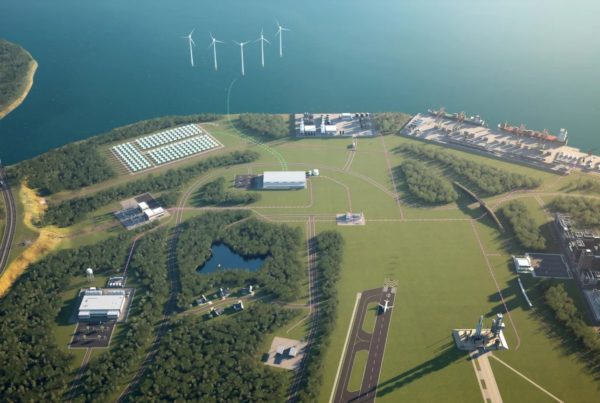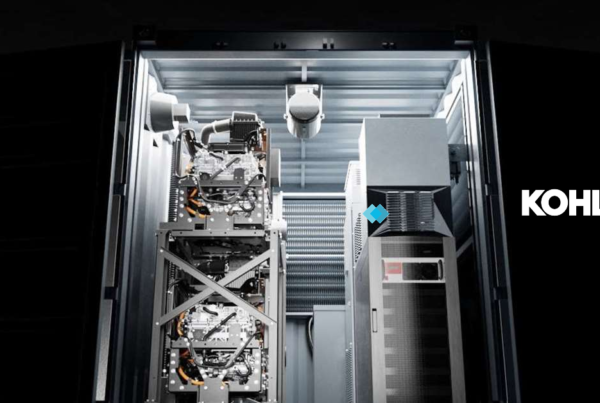
Another part of Europe’s largest fuel cell hybrid bus fleet and the first hydrogen filling station at this location were presented at the Regionalverkehr Köln GmbH site in Wermelskirchen.
The district administrator of the Rheinisch-Bergisches Kreis Stephan Santelmann, the managing director of Regionalverkehr Köln GmbH (RVK) Eugen Puderbach, the district administrator of the Euskirchen district Günter Rosenke, as chairman of the supervisory board of the RVK, and the mayor of Wermelskirchen, Rainer Bleek, presented the complex and exciting project today Wermelskirchen location.
Wermelskirchen / Rheinisch-Bergischer Kreis. In cooperation with various industrial partners, the petrol station in Wermelskirchen (Linde GmbH), another petrol station in Meckenheim in the Rhein-Sieg district and a total of 35 A330 FC (Van Hool) buses will go into operation for the RVK bus fleet. 10 of the buses are stationed in Wermelskirchen.
The industrial partner Linde, who was involved in the construction of the filling station, was also on site.
RVK has been running on hydrogen since 2011. Thanks to the support of the RVK shareholders, the then visionary project was developed in several stages through the use of two prototypes, two pre-series vehicles from 2014 to the current state: the largest fuel cell hybrid bus fleet in Europe!
Together with Mayor Rainer Bleek, Eugen Puderbach, Managing Director of the RVK, welcomed the numerous guests and expressed his thanks to the shareholders, sponsors and partners: “I can call all these comrades-in-arms pioneers who recognized the value of this alternative drive for effective climate protection early on and had the courage to help shape the project together. ”
After the necessary driver training courses and the final commissioning of the filling station, the first ten fuel cell hybrid buses will soon be starting regular service. The new filling station will then be ready for this, which in the current expansion stage will allow 20 fuel cell buses to be refueled daily. The remaining 25 buses are used at the RVK sites in Bergisch Gladbach, Meckenheim and in the city of Hürth.
District Administrator Stephan Santelmann emphasizes the milestone as pointing the way forward for the district: “The Rheinisch-Bergisch district is a pioneer when it comes to using hydrogen in local public transport. The enormous importance of this innovative technology for politics, citizens and companies is visible in the RVK hydrogen bus fleet, the hydrogen filling station in Wermelskirchen and the Grünen Mobilhof GL. “
Realization thanks to funding
Regionalverkehr Köln GmbH (RVK) receives grants from the FCH JU (Fuel Cells & Hydrogen Joint Undertaking) for the purchase of the fuel cell hybrid buses as part of the EU funding project JIVE as well as co-funding from the BMVI as part of the NIP-2 Program. The construction of the infrastructure is also supported by funds from the NIP-2 program and in Wermelskirchen by the INEA (Innovation and Networks Executive Agency) as part of the EU project MEHRLIN. Funding of around 14 million euros from the BMVI and 7 million euros from the EU will flow into the project.
By the end of 2021, RVK will integrate a further 15 fuel cell hybrid buses into its bus fleet at the corresponding locations in the Rheinisch-Bergisches Kreis, Rhein-Sieg-Kreis and in Hürth as part of the funding projects. The buses are acquired as part of the EU project JIVE 2 and by the “Fuel Cells and Hydrogen Joint Undertaking” (FCH JU), the Federal Ministry of Transport and Digital Infrastructure (BMVI) via the NIP-2 program and the Ministry of Transport of the State of North Rhine-Westphalia promoted. In summary, the RVK will then have 50 fuel cell hybrid buses.
Hydrogen and other measures in the area of climate protection
The topic of hydrogen has arrived in business and society at the latest since the national and European hydrogen strategies. And rightly so, since hydrogen is an excellent, transportable and storable energy carrier. As an alternative fuel, it means almost no emissions locally in terms of exhaust gas and the very reduced operating noise, as the buses are equipped with an electric motor. In addition, hydrogen guarantees the required ranges, short refueling times and thus high availability and flexibility of the vehicles in local public transport.
This is also emphasized by District Administrator Günter Rosenke, who as chairman of the supervisory board supported the RVK’s path to the corporate goal of “zero emissions” from the start: “RVK has already achieved a lot, but it does not rest on what it has achieved. Numerous other environmentally-oriented goals are still on the agenda. ”He gave an outlook on the upcoming RVK projects, such as the“ Education and training center for climate-neutral and digital mobility ”planned in the city of Mechernich in the Euskirchen district and the expansion of the e-bike -Rental systems at several RVK locations.
Design of the hydrogen tanks by two art students
The two elevated tanks on the premises of the Wermelskirchen branch will shortly be given a horizontal design. The two students Christina Hunold and Konstantin Behr wanted to summarize essential aspects of driving with hydrogen buses at a glance: “The bus emits a cloud that is in the process of dissolving – water vapor – in the form of the white letters“ H2 ”. Road marking strips are covered with lush, lush tufts of grass against a white surface, instead of the usual markings on tar. It becomes clear to the viewer that a bus is being operated here that only emits water vapor and is both gentle on people and the environment and also takes them further in a double sense.
Read the most up to date Fuel Cell and Hydrogen Industry news at FuelCellsWorks




